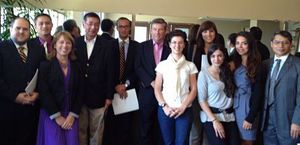
By Andrew Cohen
Berkeley Law’s International Executive Legal Education (IELE) program was still in the conceptual stage when Helene Kim became its executive director in late 2009. She likened it to a startup of sorts, founded by Dean Christopher Edley, Jr. and Associate Dean Andrew Guzman.
“My role was to develop a strategy and plan of action, and then implement a financially self-sustaining program,” Kim said. “Part of that meant defining a novel concept and audience. While executive training programs are common among business MBA programs, it’s rare to find law schools pursuing this concept. This was an opportunity for Berkeley Law to cultivate next-generation leaders in emerging regions of the world such as Asia and Latin America, by drawing upon the school’s long tradition and history of engaging with international leaders.”
Kim has since built an infrastructure for accelerated training programs geared toward international lawyers, judges, in-house counsel, business executives, and government regulators. Since the program’s launch in spring 2010, IELE has provided year-round programs for nearly 500 participants from Asia, Europe, Latin America, and Africa. Course instruction is provided by law school faculty and guest lecturers with specialized practice and industry expertise in a wide range of legal subjects.
In its short history, the international executive program has already established important relationships and signed Memorandums of Understanding with leading law schools in China, Korea, India, Mexico, and Poland, enabling their students to enroll in IELE’s certificate programs.
In addition to classroom instruction, the educational program offers its participants opportunities to network both socially and professionally with global peers and top Bay Area legal and business professionals.
“We make a concerted effort to provide a high-touch experience,” said Professor Stephen Sugarman, IELE’s faculty director. “Aside from the intensive classroom component, students also visit courtrooms, law firms, Silicon Valley companies, and more. It’s very instructive for them to see different aspects of the American system in operation, and it’s a good way for Berkeley Law to extend its reach to different parts of the world.”
IELE provides a number of judicial training programs for delegations of overseas judges from Thailand, China, Mexico and Brazil. “As the world shrinks, the demand for this kind of education grows,” said Professor Wayne Brazil, a former federal magistrate judge and IELE’s faculty advisor on judicial training programs.
Noting the convergences among global legal systems, Brazil said: “The lawyers and judges from other countries who participate in these customized courses are incredibly inquisitive and open to new ideas. They are extremely appreciative of what we teach them about our legal systems; they are enthusiastic, attentive, respectful, and eager to learn as much as possible.”
International influence
The IELE program’s wide range of global constituents include a delegation of public utility regulators from Ghana, an annual delegation of lawyers from Mexico’s UNAM Law School, and public prosecutors from China’s Supreme Procuratorate who studied anti-corruption best practices. The program also recently conducted an in-country negotiations seminar for 80 lawyers in Sao Paulo, Brazil.
IELE’s growing influence in Thailand is evidenced by its fourth consecutive year of high-impact training for that country’s National Broadcasting and Telecommunications Commission (NBTC). The commission organizes an annual delegation of its legal advisors, chosen through a competitive process, to attend IELE’s program on telecommunications and broadcast media law. Participants engage in classroom instruction and legal research on how NBTC can best develop regulations for Thailand’s growing telecommunications and Internet industries. The overseas lawyers also attend sessions with the U.S. Federal Communications Commission to discuss best practices.
“This annual program is a great example of how we can create high-level impact with emerging economies that have rapidly developing legal frameworks,” Kim said. She develops the curriculum for these highly specialized legal training programs by drawing on her own background as a Harvard Law graduate and international lawyer in San Francisco and China, and as a management strategy consultant with the Asian offices of McKinsey & Company.
One of the more popular IELE initiatives is the two-week Certificate in American Law program. Last year alone, 60 participants enrolled from 14 countries, including students and faculty from Poland’s Jagiellonian Law School sponsored by the Koret Foundation.
Jiawei He, a student at China’s Tsinghua School of Law who attended the August 2011 program, called it “a fantastic experience that remains vivid and unforgettable.” Many of these students are inspired to pursue a highly specialized course of study after they’ve completed their IELE training by applying to Berkeley Law’s LL.M. degree or Visiting Scholars program.
IELE also hosts a number of overseas delegations for brief seminars and presentations about training opportunities. Updates on these programs and delegation visits are available here.